
Biochar
Scope & Guideline
Transforming Sustainability Through Biochar Innovation
Introduction
Aims and Scopes
- Environmental Remediation:
Research in this area explores the effectiveness of biochar in removing pollutants from water and soil, including heavy metals, organic contaminants, and nutrients. Studies investigate the mechanisms of adsorption and degradation facilitated by biochar. - Soil Health and Fertility:
The journal frequently publishes studies on the impact of biochar on soil properties, including nutrient retention, microbial activity, and carbon sequestration. This research is crucial for sustainable agriculture and improving crop productivity. - Carbon Sequestration and Climate Change Mitigation:
A core focus of the journal is the role of biochar in carbon dioxide removal and its long-term stability in soils, which is essential for climate change mitigation strategies. - Innovative Biochar Production and Modification Techniques:
The journal includes research on novel methods for producing and modifying biochar to enhance its properties for specific applications, such as nutrient recovery, pollutant removal, and energy generation. - Biochar in Circular Economy:
Research highlights the use of biochar in creating sustainable waste management solutions and its role in circular economy frameworks, turning waste materials into valuable resources.
Trending and Emerging
- Advanced Catalytic Applications:
Recent publications emphasize the role of biochar as a catalyst in various chemical processes, including pollutant degradation and energy production, showcasing its versatility beyond traditional uses. - Integration with Nanotechnology:
There is a growing interest in combining biochar with nanomaterials to enhance its properties for environmental applications, such as improved adsorption capabilities and catalytic efficiency. - Biochar and Microbial Interactions:
Emerging research is focusing on the interactions between biochar and soil microorganisms, exploring how these relationships can enhance soil health and nutrient cycling. - Biochar in Energy Production:
Studies are increasingly investigating the use of biochar in energy applications, such as its role in bioenergy production and as an additive in energy storage systems. - Socio-economic and Policy Implications:
There is a rising trend towards examining the socio-economic aspects of biochar application, including its potential for sustainable development, policy frameworks, and community engagement.
Declining or Waning
- Traditional Agricultural Applications:
There has been a noticeable decrease in studies focusing solely on the traditional agricultural applications of biochar without considering its environmental implications or advanced technological modifications. - Basic Biochar Characterization Studies:
Research that focuses primarily on the basic characterization of biochar properties, such as surface area and porosity, is becoming less frequent as the field shifts towards applications and performance-based studies. - Simple Pyrolysis Techniques:
Research centered on basic pyrolysis methods for biochar production is declining as more advanced and tailored production techniques, such as hydrothermal carbonization and co-pyrolysis, gain traction.
Similar Journals
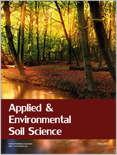
Applied and Environmental Soil Science
Pioneering research at the intersection of soil science and ecology.Applied and Environmental Soil Science, an esteemed journal published by HINDAWI LTD, focuses on disseminating high-quality research in the fields of soil science and environmental applications. With an ISSN of 1687-7667 and an E-ISSN of 1687-7675, this open-access journal has been a vital resource for the academic community since its inception in 2009. As of 2023, it holds a commendable position in the Q2 category for both Earth-Surface Processes and Soil Science, highlighting its impact in these crucial disciplines. The journal’s rankings further affirm its significance within the field, being placed 61st in Earth and Planetary Sciences and 58th in Agricultural and Biological Sciences. Researchers and practitioners alike benefit from the collaborative platform it offers for sharing innovative studies essential for sustainable soil management and environmental integrity. With a focus on advancing knowledge and fostering interdisciplinary dialogue, Applied and Environmental Soil Science stands as a crucial pillar for scholars and professionals dedicated to addressing the pressing challenges of soil and environmental health.

Soil and Water Research
Exploring Innovative Solutions for Environmental ChallengesSoil and Water Research, an esteemed journal published by the Czech Academy Agricultural Sciences, is dedicated to advancing the fields of Aquatic Science and Soil Science. With a strong commitment to open access since 2006, this journal facilitates the dissemination of high-quality research and fosters global collaboration among researchers, professionals, and students. Operating from the vibrant academic hub of Prague, Czech Republic, it serves as a key resource for those interested in pressing environmental and agricultural challenges. Featuring a robust H-index and ranking in the Q2 category for both Aquatic Science and Soil Science as of 2023, Soil and Water Research occupies a prominent position in Scopus, ensuring that published works reach a wide audience. The journal invites contributions that explore innovative methodologies and provide insights into soil and water management practices, thus playing a critical role in addressing sustainability issues within these interconnected domains. As researchers navigate the complexities of climate change and resource management, Soil and Water Research stands out as a vital tool for informed decision-making and impactful research.
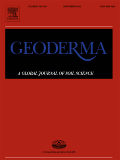
Geoderma
Bridging Theory and Practice in Soil ResearchGeoderma is a leading academic journal published by ELSEVIER, focused on the vital field of Soil Science. With an impressive impact factor and ranking as Q1 in its category for 2023, this journal stands as a prominent platform for researchers and professionals seeking to explore advanced scientific studies related to soil and its relationships with the ecosystem. Covering a wide range of topics from soil formation and characterization to land use and management practices, Geoderma is recognized for its rigorous peer-review process and is highly regarded within the global scientific community, as evidenced by its ranking of #12 out of 159 in the Scopus categories of Agricultural and Biological Sciences and Soil Science, placing it in the top 92nd percentile. With its inception dating back to 1967, the journal continually adapts and converges its content to meet the evolving demands of soil research until 2024 and beyond, providing invaluable insights for students, professionals, and researchers alike.
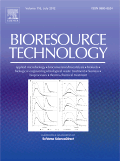
BIORESOURCE TECHNOLOGY
Unleashing the Potential of Biological Resources for Global ImpactBioresource Technology, published by Elsevier Science Ltd, is a leading journal in the fields of bioengineering, environmental engineering, and sustainable resource management. With an impressive impact factor reflected in its Q1 rankings for 2023 across multiple relevant categories, it stands out as a premier source for groundbreaking research from its inception in 1991 to its anticipated contributions through 2024. Bioresource Technology promotes the advancement of technologies and methodologies aimed at the sustainable utilization of biological resources, playing a pivotal role in tackling the challenges of waste management, renewable energy, and environmental protection. Researchers and practitioners are encouraged to contribute and engage with high-quality studies that have significant implications for the global push towards sustainability and innovation. Although the journal does not currently offer Open Access, its subscription model ensures that the rigorous peer-reviewed content remains accessible to those dedicated to advancing the field.
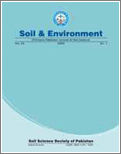
Soil & Environment
Connecting Science and Sustainability for Environmental ProgressSoil & Environment is a distinguished open access journal published by the University of Agriculture, Institute of Soil & Environmental Sciences, located in Faisalabad, Pakistan. Established in 2006, this journal has become a vital platform for disseminating pioneering research in the fields of Environmental Science and Soil Science. With an ISSN of 2074-9546, it provides a wealth of knowledge through accessible academic articles, particularly focusing on sustainable practices and innovations that impact soil and environmental health. Although currently categorized in Q4 within both Environmental Science (miscellaneous) and Soil Science, the journal is dedicated to enhancing its influence and visibility as it progresses towards convergence years that span from 2010 to 2024. Researchers, professionals, and students will find Soil & Environment an essential resource for staying informed about the latest developments and methodologies in soil conservation and environmental sustainability. By offering publicly accessible content, the journal aims to foster greater collaboration and knowledge-sharing within the global scientific community.

Frontiers in Soil Science
Cultivating insights for sustainable agriculture.Frontiers in Soil Science, published by FRONTIERS MEDIA SA in Switzerland, is an esteemed open-access journal dedicated to advancing our understanding of soil systems and their vital role in ecosystem functioning and sustainable agricultural practices. Since its inception in 2021, this journal has quickly established itself within the scientific community, boasting a 2023 Scopus Q2 ranking in Soil Science and a notable percentile of 41 among its peers. Researchers and practitioners in the field will find a wide array of original research, reviews, and contributions that address key topics such as soil health, carbon sequestration, and nutrient cycling. With a commitment to fostering collaboration and dissemination of knowledge, Frontiers in Soil Science serves as a vital resource for professionals, researchers, and students who aspire to innovate and lead in soil science research.
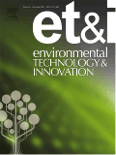
Environmental Technology & Innovation
Innovating Environmental Science for a Sustainable FutureEnvironmental Technology & Innovation is a leading academic journal published by Elsevier, focusing on groundbreaking research and advancements in the fields of Environmental Science, Plant Science, and Soil Science. Since its inception in 2014, this prestigious journal has established itself in the top Q1 quartiles of its categories, reflecting its commitment to publishing high-quality, impactful research. As evidenced by its impressive Scopus ranks, including a rank of #14/516 for Plant Science and #5/159 for Soil Science, it serves as a vital resource for scholars, researchers, and professionals aiming to advance their understanding and innovation in environmental technologies. Although it operates under a subscription model, the journal provides significant insights and access options, making it an essential addition to any researcher's library. With its emphasis on sustainability and technological advancements, Environmental Technology & Innovation remains at the forefront of addressing global environmental challenges and fostering innovative solutions.

Soil Science Annual
Empowering researchers to transform soil science.Soil Science Annual, published by Polskie Towarzystwo Gleboznawc, is an esteemed open-access journal dedicated to advancing the field of soil science and related disciplines. With its ISSN 2300-4967 and E-ISSN 2300-4975, this journal has been pivotal since its inception in 2012, providing a vital platform for researchers, professionals, and students to share innovative findings and insights. The 2023 Scopus rankings place the journal in Q2 for Earth and Planetary Sciences (miscellaneous), and Q3 for both Environmental Science (miscellaneous) and Soil Science, underscoring its influence and contribution to these fields. Housed in Warsaw, Poland, the journal fosters scholarly dialogue and dissemination of research findings critical to understanding soil mechanics, conservation practices, and sustainable land use. With its open-access model, Soil Science Annual ensures that research is accessible to a broad audience, encouraging collaboration and innovation in tackling global environmental challenges.
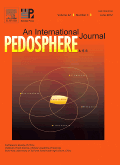
PEDOSPHERE
Pioneering Insights into Soil EcosystemsPEDOSPHERE, published by SCIENCE PRESS, is a leading journal in the field of Soil Science, holding a prestigious position in the Q1 category as per the latest evaluations, reflecting its high impact and relevance in the domain. Established in 1996, this journal is committed to advancing our understanding of soil-related processes and their interactions with various environmental components, providing a platform for innovative and high-quality research. With an impressive rank of #13 out of 159 in the Scopus classifications for Agricultural and Biological Sciences, PEDOSPHERE reaches the 92nd percentile, indicating its significance among scholarly publications. Although the journal operates under traditional access options, it remains an essential resource for researchers, professionals, and students keen on exploring the complexities of soil dynamics and sustainability. By bridging interdisciplinary methodologies and fostering collaboration, PEDOSPHERE plays a vital role in addressing global challenges related to soil management, conservation, and ecological balance.
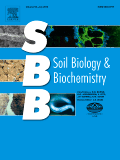
SOIL BIOLOGY & BIOCHEMISTRY
Elevating Soil Science to New HeightsSOIL BIOLOGY & BIOCHEMISTRY, published by Pergamon-Elsevier Science Ltd, is a premier academic journal that plays a pivotal role in advancing the fields of microbiology and soil science. Established in 1969, this esteemed journal has gained recognition for its rigorous publication standards and impactful research contributions, evidenced by its prestigious Q1 rankings in both Microbiology and Soil Science categories for 2023. With an impressive Scopus rank of #3 among 159 in Agricultural and Biological Sciences and #14 among 182 in Immunology and Microbiology, it boasts a notable 98th percentile in its field. The journal offers researchers, professionals, and students a vital platform for sharing innovative studies and insights about soil ecosystems and their biochemical processes, fostering greater understanding and collaboration within the scientific community. While Open Access options are currently not available, the journal remains a cornerstone for those seeking to deepen their knowledge and contribute significantly to soil biology and biochemistry.